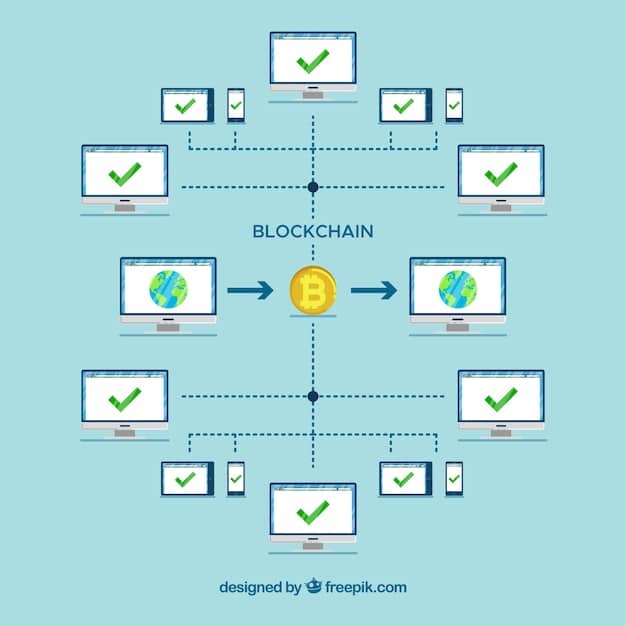Tokenized News: Can It Fund Investigative Journalism in the US?

Tokenized news aims to revolutionize funding for investigative journalism in the US by leveraging blockchain technology to create new revenue streams and incentivize quality reporting.
Can tokenized news offer a sustainable financial model for investigative journalism in the US, ensuring its survival and independence in an increasingly challenging media landscape?
What is Tokenized News?
Tokenized news represents a novel approach to journalism, merging traditional news content with blockchain technology. This innovative system aims to address the financial challenges that investigative journalism faces in the digital age.
By transforming news articles into digital tokens, media organizations can create new revenue streams and foster a more direct relationship with their audience. This model has the potential to revitalize the industry and ensure the continued production of high-quality, independent reporting.
The Basics of Tokenization
Tokenization is essentially the process of converting rights to something into a digital token on a blockchain. In the context of news, this could represent a news article, a subscription, or even a share in a media organization.
Benefits of Tokenization for News
- New Revenue Streams: Tokenization opens new avenues for monetization, such as directly selling individual articles or offering tokenized subscriptions.
- Direct Funding: Readers can directly support the journalists and publications they value.
- Increased Transparency: Blockchain technology ensures transparency in funding and distribution.
- Community Engagement: Tokenization can foster a stronger sense of community among readers and journalists.
Tokenized news offers a compelling vision for the future of journalism, one where quality reporting is directly supported by an engaged audience. This approach has the potential to address the financial challenges that have plagued the industry and ensure the continued availability of vital investigative journalism.

The Decline of Traditional Funding Models
Traditional funding models for journalism, such as advertising and subscriptions, have been in decline for years. This has particularly impacted investigative journalism, which is expensive to produce and often struggles to generate sufficient revenue.
The rise of digital platforms and social media has further disrupted the media landscape, making it harder for news organizations to attract and retain readers. This has led to widespread job losses and a decline in the quality of reporting.
The Impact on Investigative Journalism
Investigative journalism, which requires significant time, resources, and expertise, has been disproportionately affected by the decline in traditional funding. Many news organizations have been forced to cut back on investigative units or eliminate them altogether.
The Rise of “Fake News”
The decline in quality journalism has also contributed to the spread of “fake news” and misinformation. With fewer journalists dedicated to fact-checking and holding powerful interests accountable, it has become easier for false and misleading information to proliferate.
The decline of traditional funding models poses a serious threat to the future of journalism. Without viable alternatives, investigative reporting will continue to suffer, and the public will be increasingly vulnerable to misinformation.
How Tokenization Addresses Funding Gaps
Tokenization offers a promising solution to the funding gaps that plague investigative journalism. By creating new revenue streams and fostering a more direct relationship with readers, it can help ensure the survival and independence of quality reporting.
This innovative approach has the potential to transform the media landscape and create a more sustainable financial model for journalism in the digital age. It empowers readers to directly support the journalists and publications they trust, fostering a stronger sense of community and accountability.
Micro-payments for Articles
Tokenization enables micro-payments for individual articles, allowing readers to pay only for the content they consume. This can generate a significant revenue stream for news organizations, especially for investigative pieces that attract a dedicated audience.
Tokenized Subscriptions
Tokenized subscriptions offer a more flexible and rewarding alternative to traditional subscriptions. Readers can earn tokens for engaging with content, referring new subscribers, and participating in the community. These tokens can then be used to access premium content or other benefits.
Community Funding and Governance
Tokenization can also facilitate community funding and governance, allowing readers to directly invest in and influence the direction of news organizations. This fosters a stronger sense of ownership and accountability, ensuring that the publication remains true to its mission.
By addressing the funding gaps that have long plagued investigative journalism, tokenization has the potential to revitalize the industry and ensure the continued production of high-quality, independent reporting.

Examples of Tokenized News Initiatives
Several initiatives are already exploring the potential of tokenized news. These projects offer valuable insights into the practical applications of blockchain technology in journalism.
By examining these real-world examples, we can better understand the challenges and opportunities associated with tokenizing news and assess its viability as a funding model for investigative journalism.
Civil
Civil was an ambitious project that aimed to create a decentralized news ecosystem powered by blockchain tokens. While the initial project faced challenges, it laid the groundwork for future innovation in tokenized news.
Brave Browser and Basic Attention Token (BAT)
Brave Browser and its Basic Attention Token (BAT) offer a model for rewarding users for their attention and supporting content creators through micro-payments. This system could be adapted to directly fund investigative journalism.
Mirror
Mirror is a decentralized publishing platform that allows writers to crowdfund their projects and monetize their content using blockchain tokens. This platform could be used to support independent investigative journalists.
- Consider the challenges: Tokenized news is still a nascent field, and many challenges remain.
- Be prepared to adapt: The media landscape is constantly evolving, and tokenized news initiatives must adapt to survive.
- Focus on quality: Tokenization should be used to enhance the quality of journalism, not simply to generate revenue.
These examples demonstrate the diverse ways in which tokenization can be applied to news. While challenges remain, the potential benefits are significant, offering a path towards a more sustainable and independent future for investigative journalism.
Challenges and Potential Drawbacks
While tokenized news offers a promising solution to the funding challenges facing investigative journalism, it is important to acknowledge the potential drawbacks and challenges associated with this innovative approach.
By carefully considering these challenges, stakeholders can develop strategies to mitigate risks and maximize the benefits of tokenized news. This will help ensure that tokenization serves as a force for good in the media landscape.
Regulatory Uncertainty
The regulatory landscape for blockchain and cryptocurrencies is still evolving, and there is uncertainty about how tokenized news initiatives will be treated by regulators. This uncertainty could create legal and compliance challenges.
Accessibility and Adoption
Tokenized news requires readers to be familiar with blockchain technology and cryptocurrencies. This could limit its accessibility and adoption, particularly among older demographics and those with limited technical knowledge.
Volatility of Cryptocurrency Markets
The value of cryptocurrencies can be highly volatile, which could impact the financial stability of tokenized news initiatives. This volatility could make it difficult to plan for the future and attract long-term investment.
Despite these potential drawbacks, the benefits of tokenized news for investigative journalism are significant. By carefully addressing these challenges, stakeholders can pave the way for a more sustainable and independent future for quality reporting.
The Future of Investigative Journalism with Tokenization
The future of investigative journalism may very well depend on innovative funding models like tokenization. As traditional revenue streams continue to decline, it is crucial to explore new ways to support quality reporting.
Tokenization offers a path towards a more sustainable and independent future for investigative journalism. By empowering readers to directly support the journalists and publications they value, it can help ensure the survival and growth of this vital function of democracy.
The Potential for Decentralized News Organizations
Tokenization could facilitate the creation of decentralized news organizations, where journalists and readers collectively own and govern the publication. This would foster a stronger sense of community and accountability, ensuring that the publication remains true to its mission.
The Role of DAOs in Journalism
Decentralized Autonomous Organizations (DAOs) could play a key role in the future of journalism. DAOs can be used to manage funding, make editorial decisions, and reward contributors in a transparent and democratic manner.
The Importance of Education and Awareness
To ensure the success of tokenized news, it is crucial to educate readers and journalists about the benefits and risks of blockchain technology. This will help foster a more informed and engaged community, paving the way for wider adoption.
Tokenization represents a promising path towards a more sustainable and independent future for investigative journalism. By embracing this innovative approach, we can help ensure that quality reporting continues to thrive and serve the public interest.
| Key Point | Brief Description |
|---|---|
| 💰 Funding Crisis | Traditional journalism funding models are declining. |
| 🔗 Tokenization | Transforms news into digital assets for new revenue streams. |
| 📰 Examples Exist | Civil, Brave Browser are examples of tokenized solutions. |
| ⚠️ Challenges | Regulation, adoption, and market volatility are challenges. |
FAQ
Tokenized news transforms news content into digital tokens on a blockchain. This enables new revenue streams and a direct relationship between journalists and their audience, fostering a more sustainable financial model.
Traditional funding models like advertising and subscriptions face challenges from digital platforms and social media, leading to revenue decline and impacting investigative journalism, which is costly to produce.
Tokenized news creates fresh revenue streams, enables direct funding from readers, enhances transparency, and fosters a stronger community around journalism, supporting quality and independence.
Challenges include regulatory uncertainty, accessibility issues, the need for user understanding of blockchain, and the volatile nature of cryptocurrency markets, which can impact financial stability.
Tokenization can lead to decentralized news organizations, where journalists and readers collectively govern, using DAOs for transparent funding and decision-making, fostering an informed and engaged community.
Conclusion
In conclusion, while challenges exist, tokenized news presents a promising and innovative approach to fund investigative journalism in the US, potentially securing its future in an evolving digital landscape by creating sustainable financial models and directly engaging communities.





